Back and forth they go: The Royals drop Game One of the ALDS
In a historic seasaw affair, it's the Yankees who score last and steal the first game of the ALDS from the Royals.
I’m writing this edition while wearing a neck brace. That ballgame gave me a serious case of whiplash.
The Royals were ahead. Then they weren’t. Then they were back ahead. Then they weren’t. Then…You get the point. Those resilient Royals were resilient once more. They just weren’t resilient enough. This was the first postseason game in major league history to feature five lead changes. History! Just not the kind the Royals wanted to make.
They dropped the first game of the ALDS against the Yankees by a 6-5 scoreline.
As usual, there’s plenty to discuss. The offense has a pulse. The bullpen wobbles. And replay rears its ugly head.
Let’s jump to it.
The signs were there from the beginning that this could be the game where the Royals snapped out of their offensive doldrums. Against Yankee starter Gerrit Cole, the Royals made some hellacious contact in the first inning. Three balls put in play, three very loud outs.
Michael Massey went after the first pitch from Cole. The good old fashioned Esky Ambush. With that short porch in right, I thought for a moment it had a chance. (More on that damned short porch in a moment.) Bobby Witt Jr. smoked one to center that I thought for certain was a triple. Somehow Aaron Judge tracked it down for the second out of the inning. As you can see above, Witt’s ball had a .940 xBA. Rotten luck. Then it was good to see Vinnie Pasquantino smoke a ball at 105 MPH off the bat. I think we can put that broken thumb behind us for the rest of October.
Wouldn’t you know that the Royals get into a spot of hot water in the bottom of the inning when, after a leadoff walk to Gleyber Torres, a knock from Juan Soto at 72 MPH falls in down the left field line for a double. That put starter Michael Wacha immediately in the jackpot—runners on first and second with no outs. A strikeout of Aaron Judge on a patented filthy Wacha change got the crucial first out.
The next batter, Austin Wells, hit a grounder to a drawn-in Yuli Gurriel who fired home for Salvador Perez to slap the tag on Torres for the second out. Then, this beauty of a sequence from Wacha to Giancarlo Stanton.
Up, up and up some more. Stanton was hopeless against the high hard stuff from Wacha. He was never going to catch up to that.
The Royals put their first run of the game on the board in the second when Perez led off with a single which was followed by a walk to Gurriel. With runners on first and second, MJ Melendez laced a single to right field. Third base coach Vance Wilson sent Perez to grab the lead but he was cut down on a perfect one-hop throw from Soto. It was, quite frankly, a really bad send. Remember how I mentioned the Royals were smoking the ball off of Cole in the first? That continued in the second. The Perez single was at 104 MPH off the bat and the Melendez single registered 100 MPH. It was hit too hard for Perez to get from second to home.
If you want to give Wilson the benefit of the doubt on the send (and I think that is ok to do, even though I thought it was a poor send), was that the left-handed Soto was charging to his right. It was going to be difficult to get around that ball and square up to get the throw off. Yet, even though the ball was scorched, Soto was about to field it in perfect position to fire home. It was all helped by the fact that it was Perez trying to grab that extra 90 feet.
The Royals were able to scratch a run across when Tommy Pham hit one deep enough to center to get Gurriel home on a sacrifice fly.
Royals 1, Yankees 0
Think back to a couple of deep flyballs to left field at Camden Yards in the ALDS off the bats of the Orioles. Remember how they would’ve been a home run in 27 or 28 other ballparks, including at Kauffman Stadium? Well, the Royals can’t rely on the outfield dimensions to save them in this series. Not when they’re playing games in the joke that is Corporate Yankee Stadium.
To be fair to Gleyber Torres (and I cannot believe that I am being fair to Gleyber Torres), the pitch from Wacha on 1-1 was not a good offering. It was a sinker that was truly center-cut. Torres was late on it though, and lofted it just enough. Every single time a baseball goes to right field in New York in this series, you anticipate it flying over the wall. And in this case, Pham quickly ran out of real estate. Gone.
The only place that Torres fly ball is a home run? That’s right. The Soulless Vessel known as New Yankee Stadium. New York needs to take a tip from Baltimore and bulldoze about 10 rows of seats out of right field. I’m not holding my breath.
Royals 1, Yankees 2
Perhaps I doth protest too much.
After Gurriel draws another walk, this time with one out in the fourth, Melendez comes to the plate. I was in favor of Melendez starting both games of the AL Wild Card series in Baltimore because I thought he could take aim at the wall in right at Camden Yards. I was for him starting in the ALDS in Yankee Stadium because of the aforementioned jet stream that Torres took advantage of the inning prior.
Unlike the Wacha pitch to Torres, the offering from Cole was well-located: a four-seamer located on the outer edge and a bit down. Melendez just went and yanked it.
This is exactly the kind of pitch that Melendez pulls off of when he’s going poorly, opening up too soon. He’ll either miss this pitch completely or he’ll hit it harmlessly somewhere. Look at how he went after this offering.
The hips open up too early for my liking, but he’s still able to get around on this pitch that came in at 96 MPH.
With two hits through the first four innings, we’ve been waiting for a game like this from Melendez for quite some time. The Royals need someone in the lower half of the order to get going. We know what Melendez is capable of when he finds a groove. Now would be as good a time as any to get it going. It was the first postseason home run for a Royal since Alex Gordon hit his in Game One of the 2015 World Series. You know the one.
It should be noted that Gurriel got things started in the inning by working an 11-pitch walk after falling behind in the count 0-2.
All of Cole’s knuckle curves were down and Gurriel was laying off those pitches, the exception being the third pitch of the sequence that started up high and probably caught the lower edge of the zone. Gurriel went 1-2, reaching base three times. If he can continue to be a postseason Yankee-killer, we can all be good with that.
The Royals could’ve had at least one more run, but Alex Verdugo made a sliding catch of a Massey fly ball that would’ve landed fair. Plus, the ball hit the heel of Verdugo’s glove and popped up and into his bare left hand. A unfortunate bounce for Massey and the Royals
Royals 3, Yankees 2
The Yankee lineup flipped over for the third time at the bottom of the fifth. Just like in the first, Torres led off with a base on balls. After starting the confrontation with two pitches out of the zone, Wacha attacked low with a couple of cut fastballs. The key pitch in the battle was the fifth one, a sinker.
On the edge and called a ball. Wacha would eventually lose Torres. It would be his last batter of the game.
I can’t fault Matt Quatraro for a quick hook in this situation. Soto is always dangerous and while Judge has a well-documented set of the postseason yips, he’s still Aaron Judge. And the Royals bullpen has been nails down the stretch and was in lockdown mode in the Wild Card series.
Angel Zerpa was the first man up. He lasted three batters. All three reached.
Soto grounded a single to center. Zerpa fell behind Judge 2-0, pulled level at 2-2 and ultimately lost him to load the bases. Against Austin Wells, Zerpa fell behind 3-0, got it to 3-2 and then…yep…he walked in the tying run. A couple of the pitches to Wells early in the count were close, but yeah…more off the edge than on, at least according to Statcast.
(Again, I implore you to ignore the box that’s drawn over the alleged strike zone on the broadcast. It’s always wrong. The TBS box seems to be the worst one I’ve seen this year.)
The three batter minimum and then Zerpa was cut off. In next was John Schreiber. He started promisingly enough, getting Stanton to pop out to Perez and then got Jazz Chisolm to hit a grounder to first that Gurriel threw to home for the force. Two outs and the Royals were close to getting out of the jam, but Schreiber’s control deserted him against Anthony Volpe. Another bases-loaded walk. Just a total grind of an inning. Unnecessary.
Royals 3, Yankees 4
This next paragraph is going to read like the most ludicrous baseball fan fiction you’ve ever read.
Gurriel opened the sixth inning with a single, his third consecutive plate appearance reaching base. With one out, Tommy Pham hit a ground ball to short that Torres threw away allowing Gurriel to get to third and Pham to second. With lefty Tim Hill on the mound for the Yankees, Quatraro opted to pinch-hit Garrett Hampson for Kyle Isbel. Hampson yanked a low sinker past a drawn-in infield to score both Gurriel and Pham to give the Royals the lead.
I had to GIF this just to make sure I hadn’t lost my mind, because who would believe that?
For you trivia fiends, that was the third go-ahead pinch hit in Royals postseason history. The other two? Dane Iorg and his “walk-off” single in Game Six of the 1985 World Series and Christian Colón’s RBI single in Game Five of the 2015 World Series.
Too bad the outcome was the same in this game for Hampson as the previous two.
Royals 5, Yankees 4
Yankee leadoff hitters reached base in six of the eight innings. Four of those batters reached via walk. And four of those leadoff batters scored. If you’re looking for the fatal flaw in this game for the Royals it wasn’t the umpires and it wasn’t the replay command center. It was the failure of Royals pitchers to start the inning off with an out.
Quatraro was emptying his bullpen and went with Sam Long to open the sixth. Stop me if you’ve heard this before…Verdugo walked to lead off the inning. Verdugo was the ninth-place hitter and reached base three times on Saturday. Verdugo had a .291 OBP this year in what was easily the worst offensive season of his career. He advanced to second on a Soto single—his third hit of the night. That was it for Long. Michael Lorenzen was up next out of the bullpen.
Lorenzen got Judge to swing and miss on a change for his second strikeout of the game. That brought up Wells with two down and runners on first and second. The first pitch from Lorenzen was a curveball down and in. The second pitch was a change low and away. Wells pulled that one into right to plate the tying run.
It was a good, if wholly unexpected, piece of hitting. Wells slumped horribly down the stretch, hitting .111/.217/.194 in September. He closed the regular season with just one hit in his final 29 at bats. Of course he ties the game.
Royals 5, Yankees 5
After the go-ahead single from Hampson in the sixth, the Royals had just two more baserunners all game: a two-out single from Massey in that sixth inning and a two-out walk for Hampson in the eighth.
Meanwhile, the Yankees put another leadoff man on in the seventh against the Royals. This time, it was Chisholm who turned on a hanging Lorenzen curve to rip a single to right. Chisholm has some speed. He swiped a career-high 40 bags this season. Eighteen of those steals came in the 46 games he played with the Yankees. He’s been given the steady green light since he was traded from Miami.
He waited until a 3-2 pitch to go. He got a poor jump and made a bad slide into the bag. Perez, who has nabbed 23 percent of would-be thieves made a suboptimal throw.
The Royals decided to challenge that Chisholm didn’t get his foot in with that awkward slide before Massey slapped the tag. You be the judge.
This is the first frame of video where Massey’s glove changes direction, indicating that it has hit the foot of Chisholm. There’s a sliver of daylight between his heel and the corner of the bag. His foot is angled so we know for certain his toe is not on the base. The only question is, did Chisholm’s heel hit that corner of the base before Massey got his glove down? From this angle, it looks like it does.
If I’m known for anything, it’s my total distaste for replay. The standard to overturn a call is “clear and convincing” evidence. I think that standard is met here. The glove changes direction and there’s daylight between the heel and the bag. Massey’s glove continues to come down alongside the foot of Chisholm after it touches the bag. Maybe that’s what they were focused on? Nothing about replay makes sense.
Let’s be clear about one thing…If Perez makes a decent throw, Chisholm is an easy out at second. He got a horrible jump. It wasn’t a great pitch to catch and throw, but still. Credit to Massey for realizing that Chisholm wasn’t getting there and applying the tag. You know, just in case the replay control center actually decided to get something correct.
With one out, Lorenzen got Oswaldo Cabrera to go down swinging on a nasty spike curve. Then that man, Verdugo, came through again, lacing a cutter away to left field. The free out the Yankees shouldn’t have had. Chisholm scored the go-ahead, and deciding, run.
Matt Quatraro is all of us.
Royals 5, Yankees 6
So when we look back to assess the “whys” and “what-happeneds” of this Game One defeat, there is plenty to unpack. Yes, the whiffed replay is one factor. So is the fact the Royals couldn’t get the damn leadoff hitter out consistently. Want to set your opponent up for success? Put the leadoff man on. Then there was the fateful fifth inning where the Royals issued not one, but two, bases-loaded walks. Or how about the fact the Royals pitchers surrendered eight walks total? Or how about the send home of Perez in the second that perhaps prevented a bigger inning?
Yes, this game was impacted by a dumb video review, but there were some missed opportunities and gift-wrapped runs. To lean on one factor and only one as the reason for this Game One defeat minimizes the impact of the others. And there were plenty of reasons the Royals, despite scoring five runs, fell short.
When the bullpen combines to allow five hits, five walks and three runs allowed in four innings of work, it’s easy to second-guess the levers that were pulled. Should Zerpa have been the first guy out of the pen? They wanted a lefty to face Soto and Wells with the three-batter minimum and this is a situation where Zerpa has frequently been used this year. Zerpa inherited 52 runners this year, second-most in the majors. He stranded 75 percent of those runners. He worked out of a one-out bases-loaded jam in Game Two of the Wild Card series. He had walked just one batter since rejoining the team from Omaha in mid-September.
Schreiber was up next because again, those are the kinds of situations Quatraro has used him in this year. He’s been a big part of that September bullpen renaissance, but his walk rate was still uncomfortably high down the stretch at 12 percent over his 16 appearances since returning from the IL. Not my ideal candidate in that situation but Quatraro probably wanted a right-hander to face Stanton. The bullpen is very left-handed heavy. You’re not bringing Brady Singer in here.
Perhaps my main quibble is that we didn’t see Daniel Lynch IV. He could’ve been an option to open the sixth instead of Long. That was the inning Verdugo opened with a walk and eventually scored the tying run. I’d like to think Lynch could’ve been used for the first three batters of that inning, just like Long. Maybe he would’ve recorded three outs.
Then there was Lucas Erceg. Quatraro brought him in after the Verdugo single that gave the Yankees the lead in the seventh against Lorenzen. If you’re going to bring him in in the seventh, then when? Is it after Volpe strikes out? I mean, Lorenzen whiffed Volpe on the same pitch where replay botched the review of the Chisholm steal and then punched out Cabrera with that runner on second. Maybe to face the left-handed hitting Verdugo you go with Kris Bubic. Yankee manager would probably send up a pinch-hitter in that situation, but you can probably live with that. I certainly had enough of Verdugo up to that point. Outside of the threat of potential for Jasson Domínguez, this is not a particularly deep Yankee bench.
Erceg did his job which was to keep the game within a run.
Plenty for us to digest on a Sunday morning, with another 24 hours or so to dwell on this one until the next game. Game Two is Monday with Cole Ragans facing off against Carlos Rodón back at Corporate Yankee Stadium. First pitch is scheduled for 6:38.




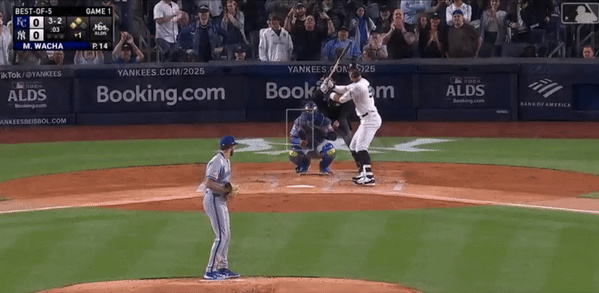
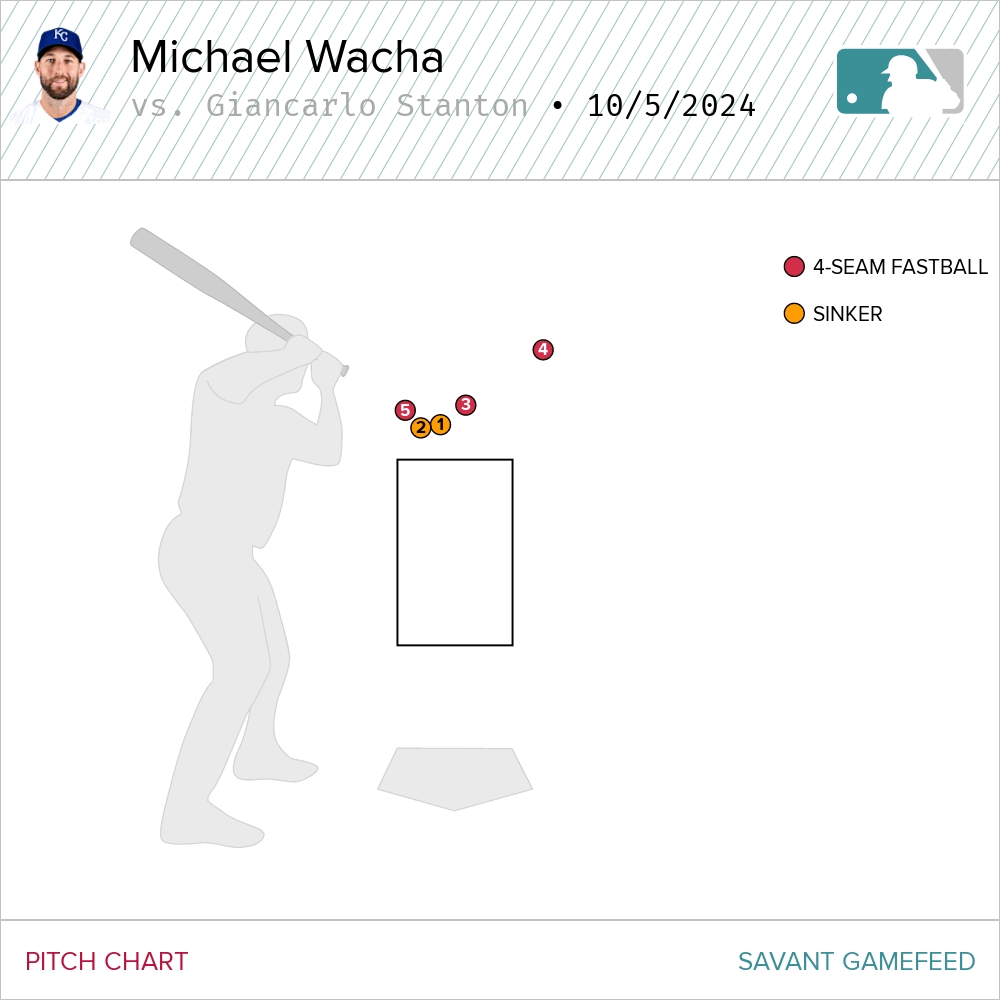



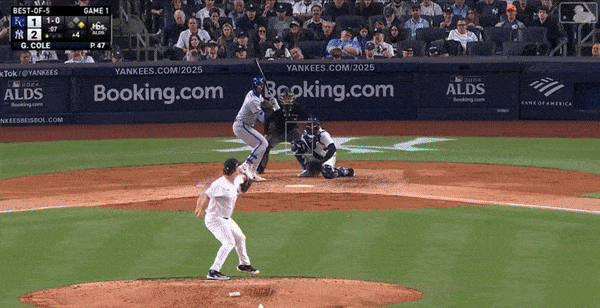
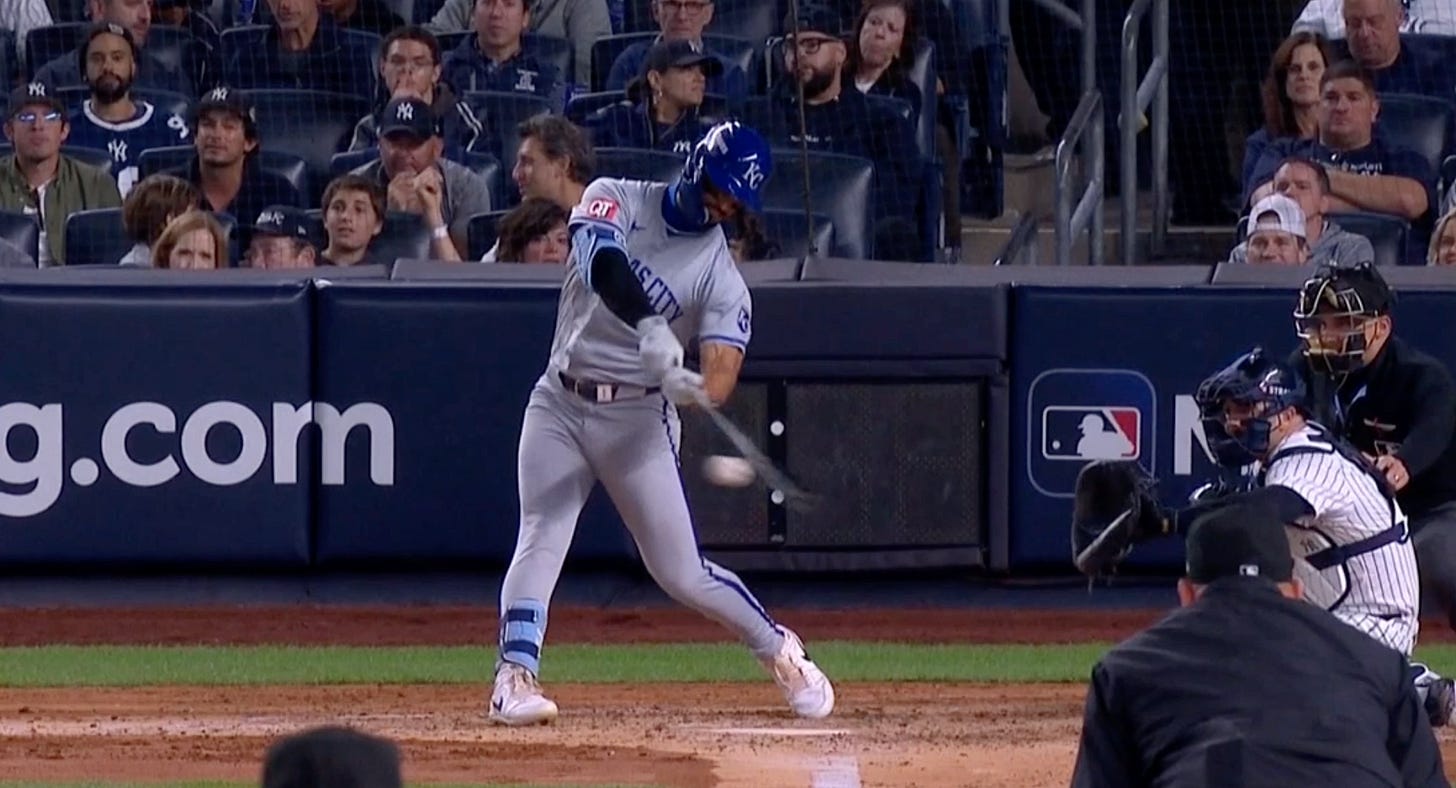
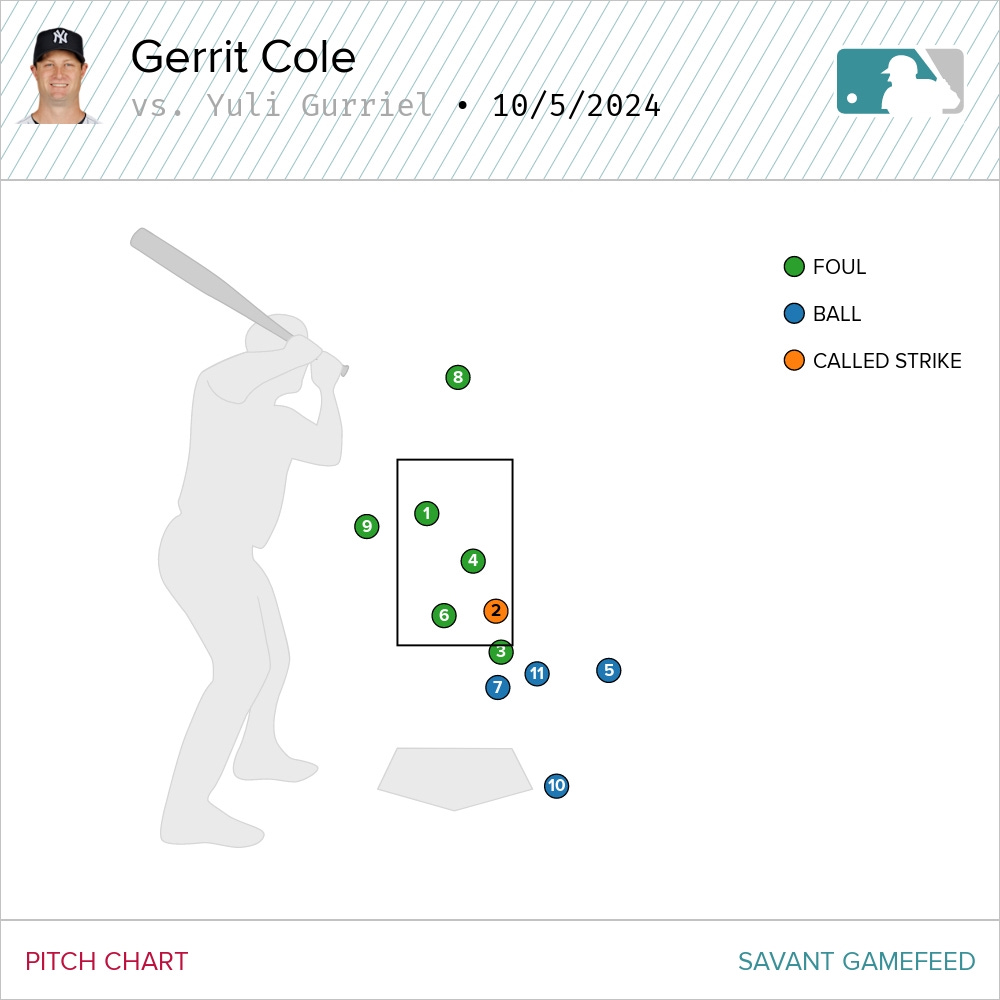


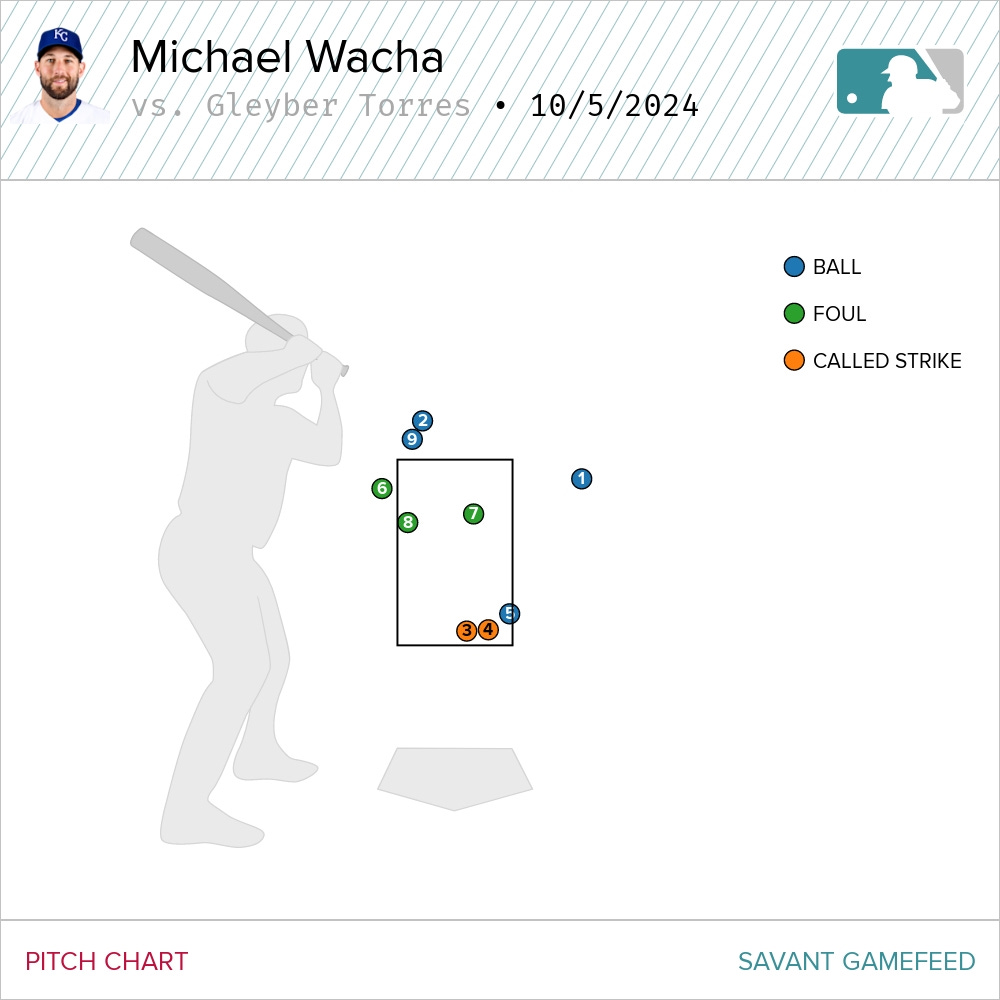

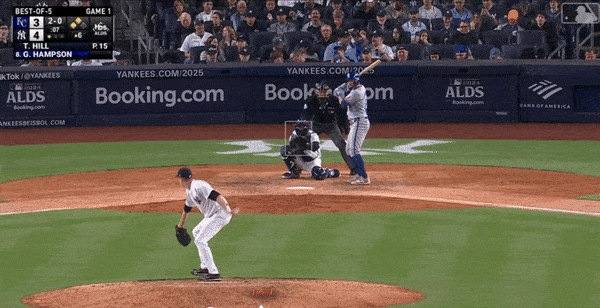


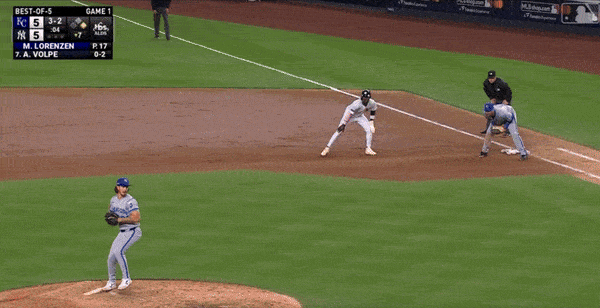
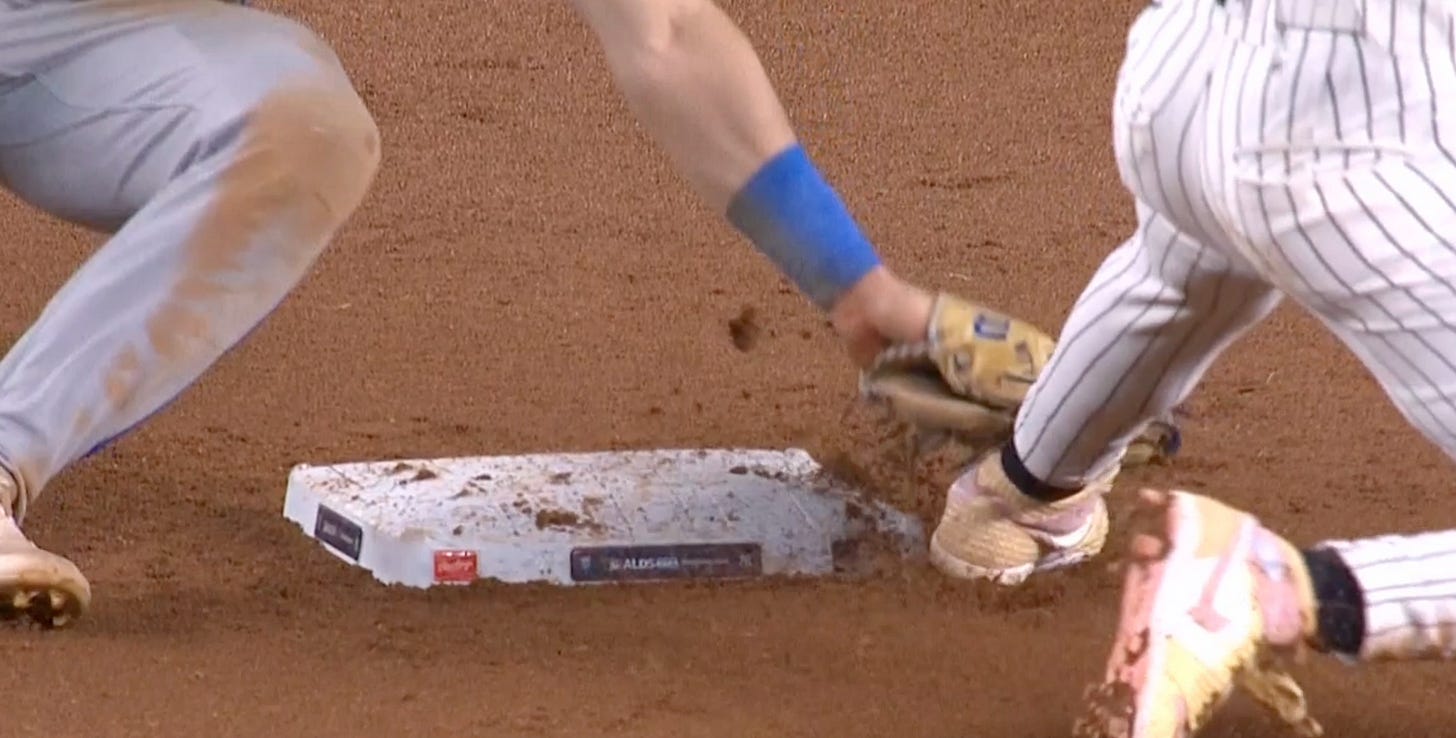
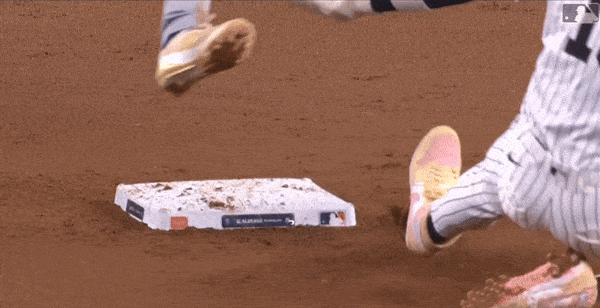
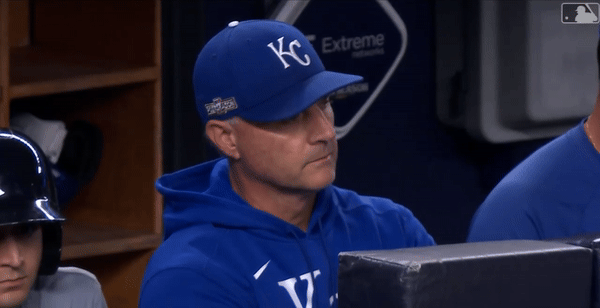


Awfully tough to win a five-game series when you give away game one: Perez, one of the slowest guys in MLB, trying to score with nobody out; the bullpen walking everybody in sight; poor throw from Salvy to second; etc. Maybe it was postseason nerves that will dissipate for game two, a but very bad start.
It was a poorly played game by both sides and the umpires didn't have the best night either.
I'm curious about your opinion of the strike zone? I have a hard time judging it without just taking the on screen placement of the pitch relative to the on screen zone as fact. I know the Yankees had some complaints, but they're also well known umpire workers. And I've never seen Bobby complain about a call like that. Maybe it was just tight over all?